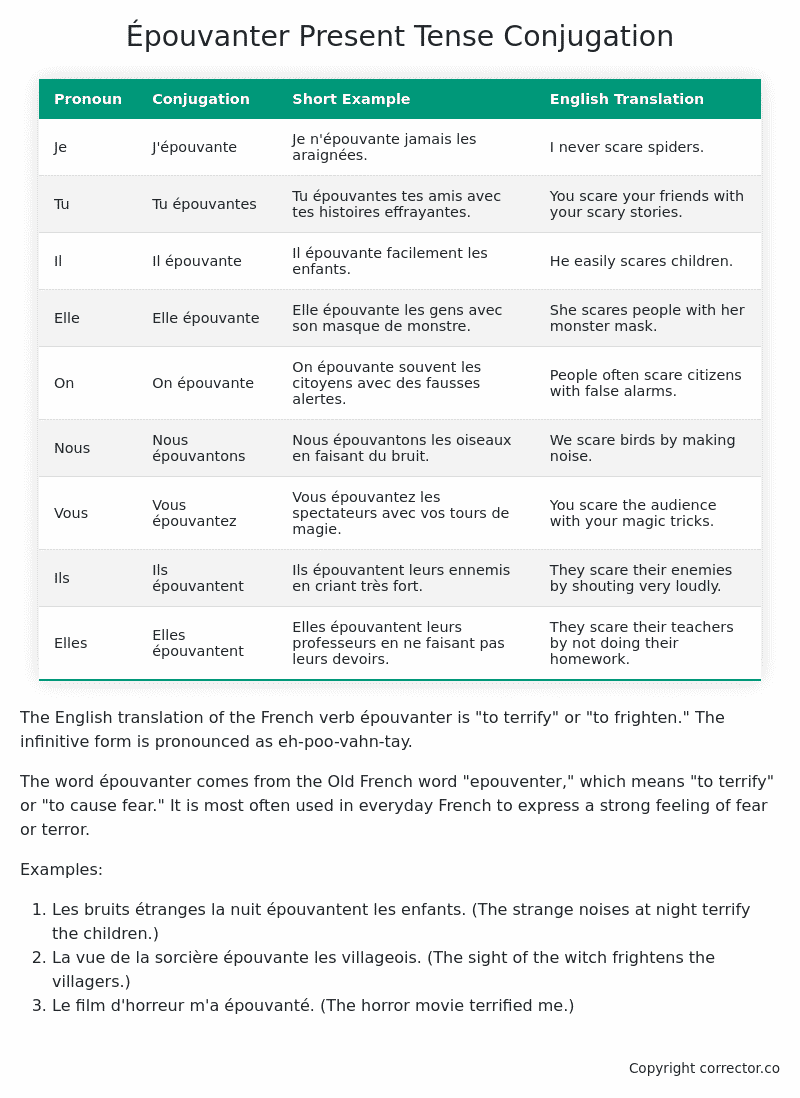Le Present (Present Tense) Conjugation of the French Verb épouvanter
Introduction to the verb épouvanter
The English translation of the French verb épouvanter is “to terrify” or “to frighten.” The infinitive form is pronounced as eh-poo-vahn-tay.
The word épouvanter comes from the Old French word “epouventer,” which means “to terrify” or “to cause fear.” It is most often used in everyday French to express a strong feeling of fear or terror.
Examples:
- Les bruits étranges la nuit épouvantent les enfants. (The strange noises at night terrify the children.)
- La vue de la sorcière épouvante les villageois. (The sight of the witch frightens the villagers.)
- Le film d’horreur m’a épouvanté. (The horror movie terrified me.)
Épouvanter – About the French Present Tense
To take a deep dive into all the French tenses then see our article on Mastering French Tense Conjugation.
Common Everyday Usage Patterns For Le Present
Interactions with Other Tenses
Table of the Present Tense Conjugation of épouvanter
| Pronoun | Conjugation | Short Example | English Translation |
|---|---|---|---|
| Je | J’épouvante | Je n’épouvante jamais les araignées. | I never scare spiders. |
| Tu | Tu épouvantes | Tu épouvantes tes amis avec tes histoires effrayantes. | You scare your friends with your scary stories. |
| Il | Il épouvante | Il épouvante facilement les enfants. | He easily scares children. |
| Elle | Elle épouvante | Elle épouvante les gens avec son masque de monstre. | She scares people with her monster mask. |
| On | On épouvante | On épouvante souvent les citoyens avec des fausses alertes. | People often scare citizens with false alarms. |
| Nous | Nous épouvantons | Nous épouvantons les oiseaux en faisant du bruit. | We scare birds by making noise. |
| Vous | Vous épouvantez | Vous épouvantez les spectateurs avec vos tours de magie. | You scare the audience with your magic tricks. |
| Ils | Ils épouvantent | Ils épouvantent leurs ennemis en criant très fort. | They scare their enemies by shouting very loudly. |
| Elles | Elles épouvantent | Elles épouvantent leurs professeurs en ne faisant pas leurs devoirs. | They scare their teachers by not doing their homework. |
Other Conjugations for Épouvanter.
Le Present (Present Tense) Conjugation of the French Verb épouvanter (this article)
Imparfait (Imperfect) Tense Conjugation of the French Verb épouvanter
Passé Simple (Simple Past) Tense Conjugation of the French Verb épouvanter
Passé Composé (Present Perfect) Tense Conjugation of the French Verb épouvanter
Futur Simple (Simple Future) Tense Conjugation of the French Verb épouvanter
Futur Proche (Near Future) Tense Conjugation of the French Verb épouvanter
Plus-que-parfait (Pluperfect) Tense Conjugation of the French Verb épouvanter
Passé Antérieur (Past Anterior) Tense Conjugation of the French Verb épouvanter
Futur Antérieur (Future Anterior) Tense Conjugation of the French Verb épouvanter
Subjonctif Présent (Subjunctive Present) Tense Conjugation of the French Verb épouvanter
Subjonctif Passé (Subjunctive Past) Tense Conjugation of the French Verb épouvanter
Subjonctif Imparfait (Subjunctive Imperfect) Tense Conjugation of the French Verb épouvanter
Subjonctif Plus-que-parfait (Subjunctive Pluperfect) Tense Conjugation of the French Verb épouvanter
Conditionnel Présent (Conditional Present) Tense Conjugation of the French Verb épouvanter
Conditionnel Passé (Conditional Past) Tense Conjugation of the French Verb épouvanter
L’impératif Présent (Imperative Present) Tense Conjugation of the French Verb épouvanter
L’infinitif Présent (Infinitive Present) Tense Conjugation of the French Verb épouvanter
Struggling with French verbs or the language in general? Why not use our free French Grammar Checker – no registration required!
Get a FREE Download Study Sheet of this Conjugation 🔥
Simply right click the image below, click “save image” and get your free reference for the épouvanter Present Tense tense conjugation!

I hope you enjoyed this article on the verb épouvanter. Still in a learning mood? Check out another TOTALLY random French verb present conjugation!


